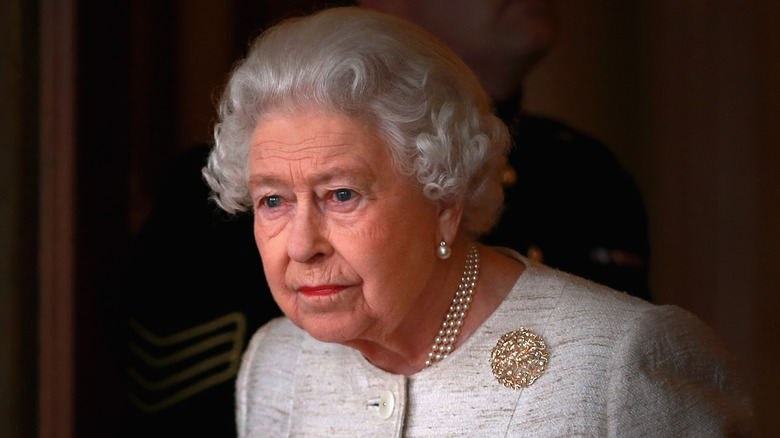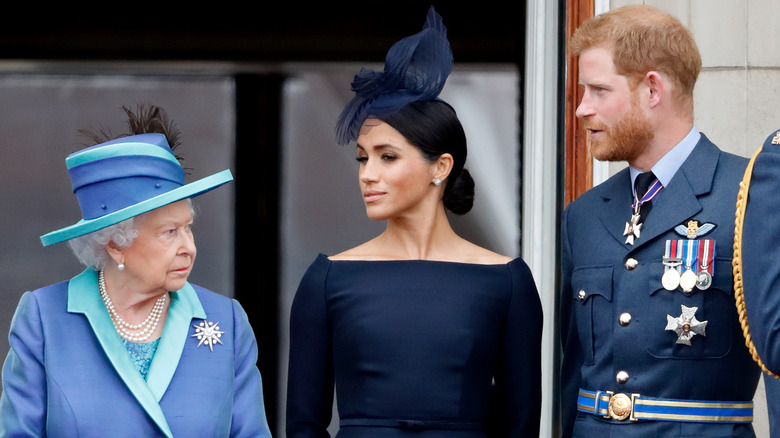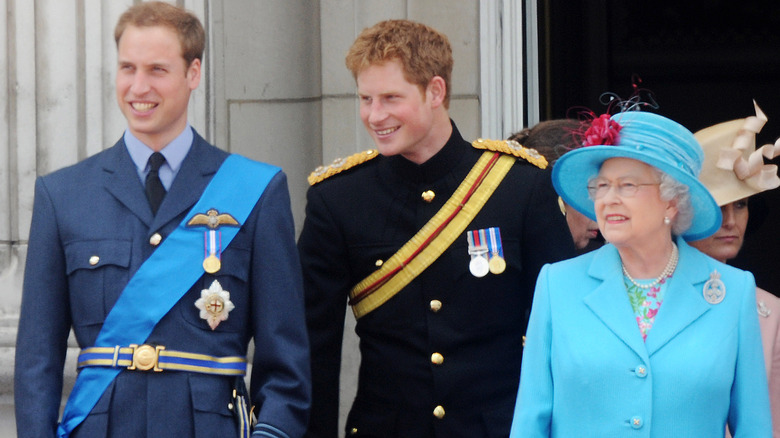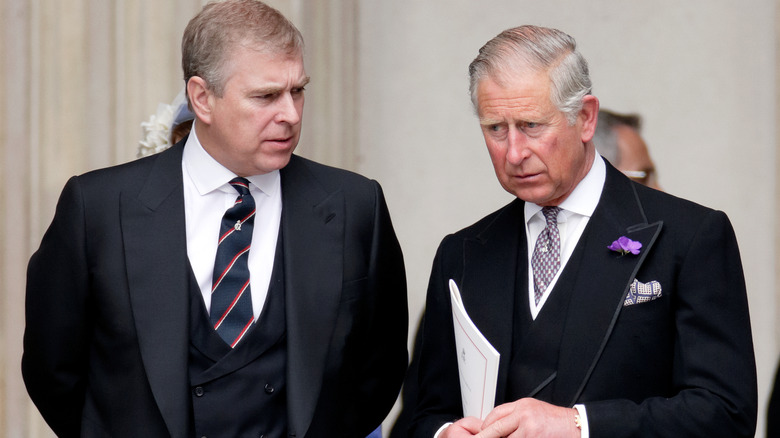Queen Elizabeth Would Be Devastated To See The State Of Her Family Today
Queen Elizabeth II shaped the monarchy for the modern world during her record-breaking time on the throne. And, surprisingly, there's one person to thank for that — Wallis Simpson. If King Edward VIII had been allowed to marry the twice-divorced American socialite and they'd had a child, Elizabeth likely never would've become queen. Or, if Edward had foregone his relationship with Simpson, remained king, and continued his reign until his death in 1972, Edward's heir still would have been Elizabeth, since her father died in 1952. But that would have made Her Majesty the monarch in her 40s, giving her a 50-year tenure instead of a 70-year one.
All of this is to demonstrate how much the queen understood what can happen if one person allows their personal life to take precedence over the royal family; the singular action of Edward's abdication threw the entire country into turmoil, and inevitably changed the course of history. Her Majesty saw firsthand the importance of propriety and loyalty within The Firm and how it corresponded to the stability of the U.K. She worked her entire life to be a reliable force in service of her country and the commonwealth and she was dedicated to keeping the royal family intact and moving forward.
Knowing the values Queen Elizabeth held so dear, it's clear that she would be devastated to see the state of her family today.
Queen Elizabeth valued privacy and putting on a brave face for the world
Queen Elizabeth II was remarkably popular throughout her time on the throne. In fact, at the end of Her Majesty's reign, more than 80% of those polled had a positive opinion of her. Part of what made her so beloved was how she didn't ruffle any feathers. The queen didn't air any behind-the-scenes drama, and if "The Crown" is any indication, there definitely was some. Yes, we know that "The Crown" is fictionalized, but every family has its secrets, and Queen Elizabeth definitely could have spilled some tea if she wanted to.
Her unofficial motto — "never complain, never explain" — is pretty much the opposite of what Prince Harry, the Duke of Sussex, and Meghan Markle, the Duchess of Sussex did after her death in 2022 with the publication of his memoir, "Spare," and perhaps most tellingly, their docuseries, "Harry & Meghan." Look no further than Buckingham Palace's statement after their bombshell interview with Oprah Winfrey in 2021; the queen noted that there were indeed matters to discuss, but those matters would be discussed privately (via USA Today).
But did Meghan and Harry keep things private after the Oprah interview? Nope. Did they continue to both complain and explain? Yes. Might there be more to the story that we don't know? Probably. But all said, having the Sussexes publicly go through the faults they found with The Firm even after Her Majesty made it clear that she wanted a private chat would certainly have brought the queen great distress.
Queen Elizabeth would want William and Harry to get along
Queen Elizabeth II was dedicated to the monarchy, so to see anything or anybody putting it in jeopardy would be heartbreaking for her. A number of anecdotes that Prince Harry shared in the Netflix docuseries and in "Spare" after the queen's death put his brother, Prince William, the future king, in a bad light — particularly damning was the description of him physically pushing Harry to the ground at one stage. This type of conduct isn't many people's idea of what makes a good king, and outing William's bad behavior, which Her Majesty probably hadn't heard about before, could help turn more of the public against the monarchy in general.
Crucially, for the royals to survive, William needs continued public trust, particularly considering how barely a third of young Brits are in favor of even keeping the monarchy around. And to see William and Harry continue to not even be on speaking terms would undoubtedly have been upsetting. Queen Elizabeth understood what it was like to have a sibling with a different temperament, too.
She was the more measured, dutiful older sibling while Princess Margaret was the royal wild child. But while the sisters didn't always have an easy relationship, they never let their differences come between them to the point that they didn't speak for years. The two remained close with the famously stoic queen even shedding a public tear at her sister's funeral in 2002.
King Charles and Prince Andrew's drama would have distressed the queen
Once Queen Elizabeth II died, King Charles III began working to oust Prince Andrew from the Royal Lodge, a mansion on the Crown Estate in Windsor that Andrew has lived in since 2003 — a move that would've angered Her Majesty, especially considering how she consistently took care of Andrew while she was alive by giving him an annual allowance and making sure he could stay in his home despite Andrew no longer being a working royal.
Andrew was often considered the queen's favorite child, and it wasn't until the public scandal that connected Andrew to convicted sex offender Jeffrey Epstein and the accusations of sexual abuse that Andrew was stripped of his royal titles and his option to use the title His Royal Highness. The queen notably didn't cast Andrew out in the cold after that, though, even helping to pay for Andrew's legal fight against the assault allegations.
If it was okay for Andrew to live in the Royal Lodge with his mother as monarch, why does Charles think he knows better? It's telling that he didn't try to get Andrew pushed out before their mother died. Queen Elizabeth would have seen the ongoing family drama airing out in public from her grandsons to her sons as antithetical to her beliefs of loyalty and duty to the crown. We can only hope that things turn around in the house of Windsor.



